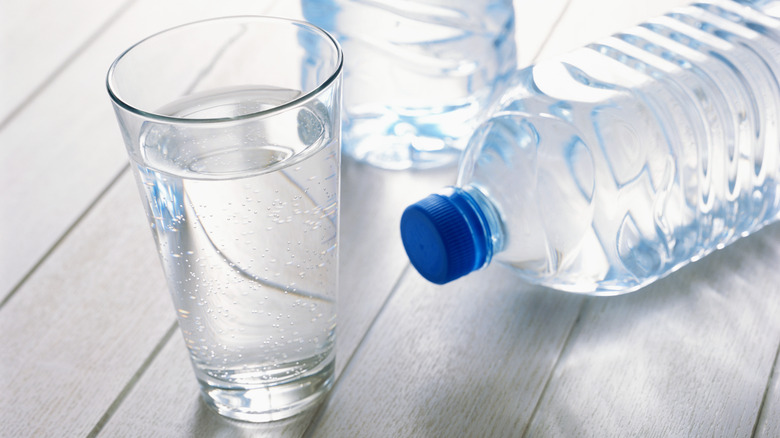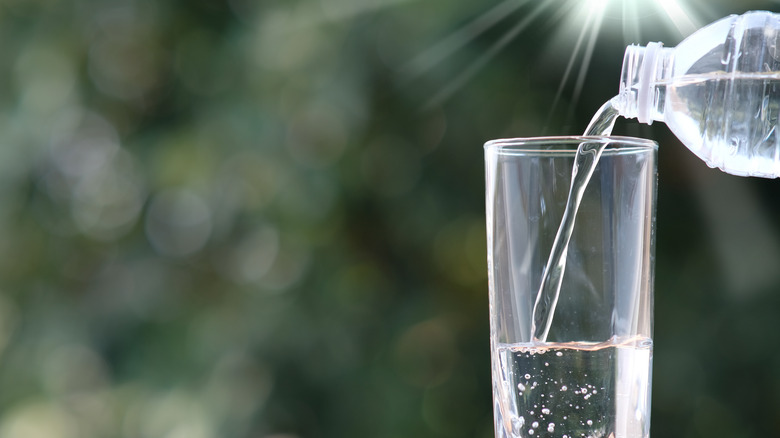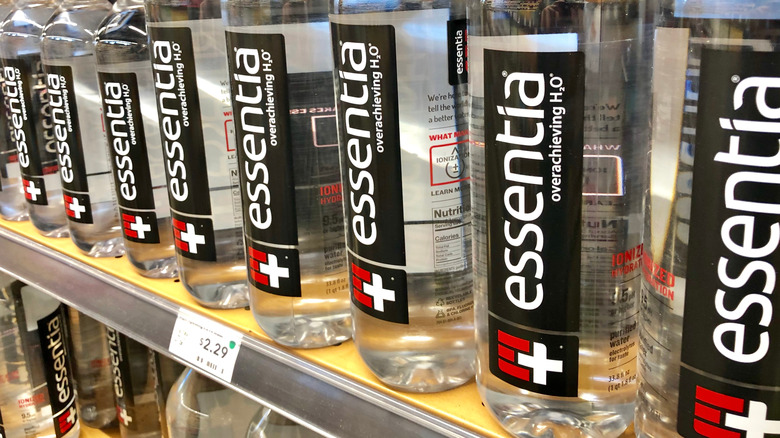Commercially Bottled Waters Began As Unofficial Health Tonics
Hopefully, you don't need us to tell you that drinking water is important. Water is vital to all life on Earth, but you wouldn't consider it to be medicine, would you? Probably not, yet that's essentially what the very first brands of bottled water claimed to be, via the Sun Journal. But water hasn't always been considered healthy. According to the National Museum of American History, urban waterways in Colonial times were severely polluted by people dumping garbage, chamber pots, and even animal carcasses into them. Consequently, bacteria-free alcohol in the form of cider or whiskey was considered a healthier alternative.
If people wanted clean water, they had to seek out rural springs or wells. For those who could access it, such water was treasured. Since ancient times, spring water has been valued for reasons transcending hydration alone. Early Egyptian and Arabian societies used spring water to treat illnesses, and the Hippocrates of ancient Greece had much praise for mineral water, via ResearchGate. In the 1800s, hot springs became a major attraction for wealthy American tourists, and their legacy lives on in place names like Saratoga Springs, New York, or Palm Springs, California. According to The Atlantic, many physicians at the time claimed that spring water "could cure everything from hiccups to cancer." Considering its popularity, it was only a matter of time before someone figured out how to bring the water to consumers, rather than the other way around.
Early bottlers made big promises
The first water bottling plant was established at the Holy Well in England in 1621, per BCC Research, while the first such business in America was Jackson's Spa of Boston, which started in 1767. However, it was the natural springs craze of the 1800s that really launched the bottled water industry. In 1844, an innkeeper in Maine claimed he was saved from the brink of death by drinking the water from a local spring. He converted his inn into a spa and started a family business selling bottled water under a brand name you might recognize: Poland Spring.
Poland Springs was originally marketed as a health tonic with near-magical powers. According to the Sun Journal, early advertisements for Poland Springs' water claimed to cure indigestion, liver disease, kidney disease, and kidney stones. While these are bold claims indeed, some of them do have a basis in reality, namely the idea that water is beneficial to the kidneys. The National Kidney Foundation affirms that water helps the kidneys remove waste, and reduces the risk of kidney stones. However, they also note that anyone experiencing kidney failure actually needs to restrict water consumption. The use of water as a cure is called hydropathy, and Britannica states that "its effectiveness is generally accepted to be limited."
The first bottled waters set the stage for today's brand
Do tales of bottled water brands marketing their products as health remedies sound eerily familiar to you, that's because the trend never really stopped, it just changed. Right now, you might be thinking of brands like Smartwater and Essentia that advertise benefits such as added electrolytes or balanced pH levels. Is there any more truth in these claims than there was in those of St. Catharines Mineral Water? According to Healthline, water fortified with electrolytes (minerals that conduct electricity) is really useful when you sweat a lot from exercise or heat, or when you lose a lot of fluid due to illness. Outside of those cases, however, plain water is just fine.
But what about alkaline water, which uses alkaline salts (like you find in club soda) to raise its pH level? According to the Mayo Clinic, some studies suggest that alkaline water might benefit your bones, but brands that advertise it as a way to prevent disease or neutralize the acid in your bloodstream have little evidence to back their claims. At this point in time, there's not much difference between bottled water and tap water in developed countries, certainly not when it comes to health. In fact, Medical News Today reports that tap water in the United States is tested more frequently than bottled water to ensure its safety.


